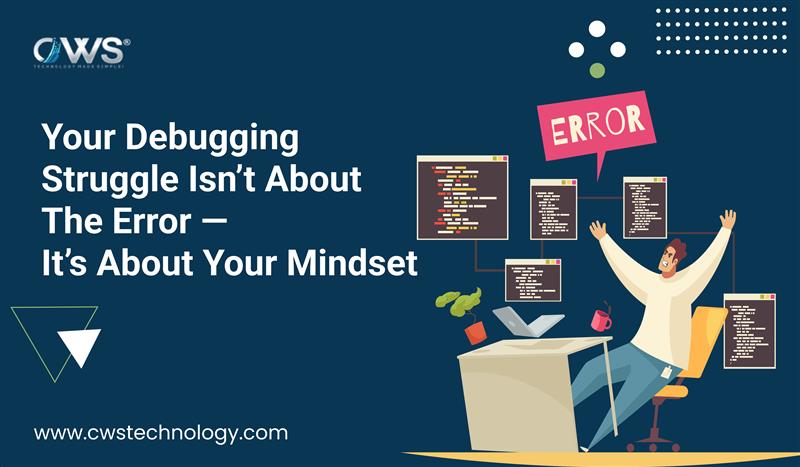Debugging has always been described as the most time-consuming part of a developer’s life. Every programmer—whether new to the craft or seasoned after decades of coding—faces those frustrating moments when a single missing semicolon or misaligned variable seems to bring an entire system crashing down. Yet here’s the truth: the core of your debugging struggle is rarely about the actual error. It is about the way you approach the problem.
This is not just about fixing broken code; it is about recognizing how your mindset either sharpens or clouds your ability to see what’s really happening.
Why Debugging Feels Overwhelming
Think back to the last time you faced a stubborn bug. The console screamed errors at you, the application froze, or worse—everything compiled perfectly, but the output was just wrong.
What happened inside your mind? Frustration, self-doubt, maybe even panic. Many developers unconsciously start believing that the bug reflects their competence. The more pressure you feel, the harder it becomes to focus. In reality, the bug is neutral—it does not care who wrote the code. What matters is how you choose to respond.
The Psychology Behind Debugging
Coding is often presented as a purely logical activity. However, debugging reveals its deeply psychological side. When you are tired, anxious, or rushing against deadlines, your brain tends to tunnel-vision into assumptions:
- “It has to be in this function.”
- “It must be the database query.”
- “I’m sure I already checked that.”
But what if you were wrong? Debugging requires a mindset of curiosity and humility—an openness to the possibility that the issue lies outside your immediate assumptions. This is why the debugging mindset is not about raw intelligence but about managing how your brain reacts to uncertainty.
Reframing Debugging: From Enemy to Teacher
Most developers see debugging as the enemy of productivity. But the mindset shift comes when you stop treating bugs as setbacks and start viewing them as teachers. Each bug is feedback. It tells you where your assumptions about the system do not align with reality.
At CWS, teams are encouraged to adopt this reframing exercise: instead of asking “Why is this error ruining my flow?”, try asking “What is this bug trying to reveal about my design, my approach, or my process?”
That small shift in wording changes the emotional weight of the problem. Debugging becomes less about proving yourself right and more about discovering what you missed.
Practical Strategies to Build a Strong Debugging Mindset
Mindset is not abstract—it translates into daily practices that either accelerate or block progress. Here are some globally relevant strategies used by effective developers:
1. Pause Before You Dive
The instinct is to immediately rewrite code or add console logs everywhere. But stepping back—even for a few minutes—gives your brain room to reset. Often, fresh eyes reveal what frustration concealed.
2. Break the System into Small Pieces
Large, complex problems create stress. Divide the code into isolated parts and test them independently. Narrowing the scope reduces overwhelm and sharpens focus.
3. Challenge Your Assumptions
If you are sure you already checked something, check it again. Overconfidence blinds you to simple mistakes. Debugging is not about defending your pride; it is about validating reality.
4. Create a Debugging Ritual
Some developers keep a notepad beside them, writing down each step as they test hypotheses. Others use a “rubber duck” approach—explaining the issue aloud, even to an inanimate object. These rituals anchor your mindset and prevent chaotic wandering.
5. Rest When Needed
A tired brain magnifies errors. Walking away may feel like giving up, but it often saves hours of unproductive thrashing. Global studies in cognitive science prove that sleep and rest enhance problem-solving more than continuous effort.
The Global Angle: Debugging Across Cultures
The mindset in debugging is also shaped by culture. In some parts of the world, failure is stigmatized, making developers more defensive when bugs appear. In other cultures, failure is seen as experimentation, encouraging more relaxed problem-solving.
For global teams like those at CWS, where developers from different backgrounds collaborate, cultivating a shared mindset is critical. Instead of framing debugging as “finding mistakes,” we encourage teams to see it as exploring system behavior. This reduces blame, builds trust, and promotes learning across diverse perspectives.
The Silent Skill That Separates Good Developers from Great Ones
Anyone can learn syntax. Anyone can master frameworks. But the ability to manage your debugging mindset is what separates a competent coder from a great developer. Great developers do not panic when things break—they approach it with calm curiosity.
Think of debugging like detective work. The best detectives do not assume; they investigate systematically, free from ego. Similarly, the strongest developers are those who can control their reactions, pace their thoughts, and welcome bugs as part of the journey rather than disruptions.
Building a Debugging Culture in Teams
While individual mindset matters, organizations also play a huge role. At CWS, building a healthy debugging culture means:
- Encouraging open communication about bugs without fear of judgment.
- Documenting not just the fix, but the thought process that led to it.
- Holding collaborative debugging sessions to blend perspectives.
- Valuing patience and persistence as much as speed.
This approach not only improves technical outcomes but also fosters psychological safety, which is essential for global teams.
The next time you are knee-deep in a stubborn error, remember: the struggle is not against the bug itself. It is about how you choose to see it. Shift your mindset, and debugging transforms from a painful chore into a powerful teacher.
Errors will always exist in software. But whether they break you or build you—that depends on your mindset.








